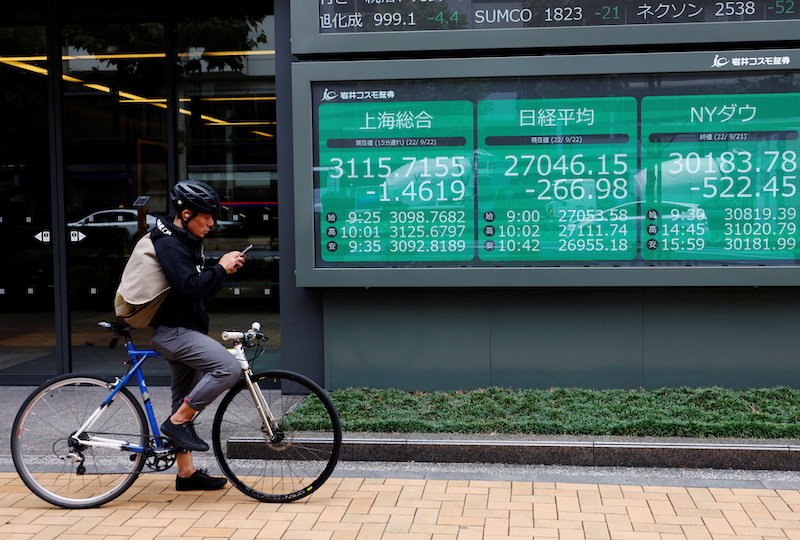Asian share markets saw a mixed day on Thursday with traders attempting to digest a cocktail of plunging and rebounding currencies amid an ever gloomier global economic outlook.
Wall Street ended sharply higher overnight following its recent sell-off, after Treasuries yields fell, as the Bank of England launched an emergency bond-buying programme to stabilise a furious sell-off in gilts, and that lifted Asia markets in early trading.
Japan’s Nikkei ended 1% higher, rebounding from a near three-month low hit in the previous session, led by drugmakers tracking overnight Wall Street gains.
The Nikkei advanced 0.95% to 26,422.05, recovering from a low of 25,936.36 hit on Wednesday, a level that matched a July low. The broader Topix gained 0.74% to 1,868.80.
“The main driver for the Nikkei’s gain was an advance of Wall Street overnight, which was fuelled by the Bank of England’s action,” Chihiro Ohta, assistant general manager at the investment research and investor services at SMBC Nikko Securities, said.
Also on AF: Tata Launches Budget $10k EV in Bid to Extend India Dominance
China and Hong Kong stocks rebounded at the open but slid back later on despite sentiment being boosted by a pause in the yuan’s slide and fresh government attempts to aid the economy.
The Chinese stock market was also helped by a steadier yuan, after the People’s Bank of China on Wednesday warned against one-way currency bets, stressing that the yuan’s stability was a top priority.
Nevertheless, indexes on the mainland and in Hong Kong ended in the red as sterling’s struggles continued to reverberate across Asia’s trading floors.
And tourism, media and liquor stocks weakened, as worries over Covid-19 outweighed optimism ahead of the Golden Week holiday.
The Shanghai Composite Index dipped 0.13%, or 3.86 points, to 3,041.20, while the Shenzhen Composite Index on China’s second exchange dropped 0.05%, or 1.06 points, to 1,937.20.
In Hong Kong, property shares slid further. An index tracking mainland developers listed in Hong Kong fell 2.5% to a record low, following Wednesday’s 6.4% slump.
The Hang Seng Index dropped 0.49%, or 85.01 points, to 17,165.87 as it continued to languish around 11-year lows.
Singapore, Bangkok Lead Gains
Elsewhere across the region, equities were broadly higher, with Jakarta and Mumbai the only other markets apart from China’s trading in negative territory. Singapore and Bangkok led the gains, rising 1.1% each. Equities in the Philippines climbed 0.8%.
Mumbai’s signature Nifty 50 index was down 0.24%, or 40.50 points, at 16,818.10.
Globally, the dollar tightened its hold on the currency markets, recession fears sapped stocks and bonds suffered more interest rate pain.
Europe’s open was brutal. The STOXX 600 share index dropped nearly 2% from the open, while both the euro and the pound, hammered over the last week by UK debt concerns, slumped 1%.
Government bond markets were braced for German data expected to show consumer prices rising there at the fastest rate since the 1950s. Gilt selling also resumed a day after the Bank of England dramatically intervened in the UK market to try and quell the storm around the government’s spending plans.
“The market wouldn’t mind some stability, it has become a little bit unpredictable,” Barings Investment Institute’s Chief European strategist Agnes Belaisch, said.
Dollar’s Crushing Rise
But it is the dollar which has crushed currencies virtually everywhere this year.
Speaking with reporters in London on Wednesday, veteran Federal Reserve policymaker Charles Evans gave no indication that any of the recent drama would blow the US central bank off its rate hike course.
“We just really need to get inflation in check,” Evans said, backing lifting the Fed’s rates – now at 3%-3.25% – to a range of 4.5%-4.75% by the end of the year or March.
Thursday’s moves saw the US dollar index, which measures the currency against sterling, the euro and four other peers, rise back towards its recent 20-year high again having had its worst session in two-and-a-half years on Wednesday.
Oil prices were down again after gaining more than $3 in the prior session, with the strong dollar capping oil demand and concerns over the faltering global economic outlook clouding market sentiment.
Key figures
Tokyo – Nikkei 225 > UP 0.95% at 26,422.05 (close)
Hong Kong – Hang Seng Index < DOWN 0.49% at 17,165.87 (close)
Shanghai – Composite < DOWN 0.13% at 3,041.20 (close)
London – FTSE 100 < DOWN 1.55% at 6,896.57. (0950 BST)
New York – Dow > UP 1.88% at 29,683.74 (Wednesday close)
- Reuters with additional editing by Sean O’Meara
Read more:
China’s PBOC Calls on State Banks to Defend the Yuan
Chinese Banks Test Digital Yuan for Cross-Border Settlements























